“Why should you?”
“He was very good–looking. D’you remember the other afternoon when I met you in the plantation? I couldn’t take my eyes off him. And then at supper, and afterwards when we danced together. I suppose you’d call it love at first sight.”
“I’m not sure that I would.”
“Oh?” She looked at him with an air of surprise, which changed to a quick, scrutinizing glance, as though for the first time she paid him attention. “I knew he’d taken a fancy to me. I felt something I’d never felt in my life before. I wanted him simply frightfully. I generally sleep like a log. I was terribly restless all night. Father wanted to bring you his translation and I offered to drive him down. I knew he was only staying a day or two. Perhaps if he’d been staying a month it wouldn’t have happened. I should have thought there was plenty of time, and if I’d seen him every day for a week I daresay I shouldn’t have bothered about him. And afterwards, I didn’t regret it. I felt contented and free. I lay awake for a little while after he left me that night. I was awfully happy, but, you know, I didn’t really care if I never saw him again. It was very comfortable to be alone. I don’t suppose you’ll know what I mean, but I felt that my soul was a little light–headed.”
“Have you no fear of consequences?” asked the doctor.
“How d’you mean?” She understood and smiled. “Oh, that. Oh, doctor, I’ve lived on this island almost all my life. When I was a child I used to play with the children on the estate. My great friend, the daughter of our overseer, is the same age as me and she’s been married for four years and has had three babies. You don’t imagine sex has many secrets for Malay children. I’ve heard everything connected with it talked about since I was seven.”
“Why did you come to the hotel yesterday?”
“I was distracted. I was awfully fond of Erik. I couldn’t believe it when they told me he’d shot himself. I was afraid I was to blame. I wanted to know if it was possible that he knew about Fred.”
“You were to blame.”
“I’m dreadfully sorry he’s dead. I owe a great deal to him. When I was a child I used to worship him. He was like one of grandpa’s old Vikings to me. I’ve always liked him awfully. But I’m not to blame.”
“What makes you think that?”
“He didn’t know it, but it wasn’t me he loved, it was mother. She knew it and at the end I think she loved him, too. It’s funny if you come to think of it. He was almost young enough to be her son. What he loved in me was my mother, and he never knew that either.”
“Didn’t you love him?”
“Oh, very much. With my soul, not with my heart, or with my heart, perhaps, and not with my nerves. He was very good. He was wonderfully reliable. He was incapable of unkindness. He was very genuine. There was something almost saintly in him.”
She took out her handkerchief and wiped her eyes, for while talking of him she had begun to cry.
“If you weren’t in love with him, why did you become engaged to him?”
“I promised mother I would before she died. I think she felt that in me she would gratify her love for him. And I was very fond of him. I knew him so well. I was very much at home with him. I think if he’d wanted to marry me just when mother died and I was so unhappy I might have loved him. But he thought I was too young. He didn’t want to take advantage of the feelings I had then.”
“And then?”
“Daddy didn’t very much want me to marry him. He was always waiting for the fairy prince who would come and carry me off to an enchanted castle. I suppose you think daddy’s feckless and unpractical. Of course I didn’t believe in a fairy prince, but there’s generally something behind daddy’s ideas. He has a sort of instinct for things. He lives in the clouds, if you know what I mean, but very often those clouds glow with the light of heaven. Oh, I suppose if nothing had happened we should have married in the end and been very happy. No one could have helped being happy with Erik. It would have been very nice to see all those places he talked about. I should have liked to go to Sweden, to the place where grandpa was born, and Venice.”
“It’s unfortunate that we ever came here. And, after all, it was only a chance; we might just as well have made for Amboyna.”
“Could you have gone to Amboyna? I think it was fated from all eternity that you should come here.”
“Do you think our destinies are so important that the fates should make such a to–do about them?” smiled the doctor.
She did not answer and for a little while they sat in silence.
“I’m terribly unhappy, you know,” she said at last.
“You must try not to grieve too much.”
“Oh, I don’t grieve.”
She spoke with a sort of decision, so that the doctor looked at her with surprise.
“You blame me. Anyone would. I don’t blame myself. Erik killed himself because I’d fallen short of the ideal he’d made of me.”
“Ah.”
Dr. Saunders perceived that her instinct had come to the same conclusion as his reasoning.
“If he’d loved me he might have killed me or he might have forgiven me. Don’t you think it’s rather stupid the importance men, white men at least, attach to the act of flesh? D’you know, when I was at school in Auckland I had an attack of religion—girls often have at that age—and in Lent I made a vow that I wouldn’t eat anything with sugar in it. After about a fortnight I hankered after something sweet so that it was positive torture. One day I passed a candy shop and I looked at the chocolates in the window and my heart turned round inside me. I went in and bought half a pound and ate them in the street outside, every one, till the bag was empty. I shall never forget what a relief it was. Then I went back to school and denied myself quite comfortably for the rest of Lent. I told that story to Erik and he laughed. He thought it very natural. He was so tolerant. Don’t you think if he’d loved me he would have been tolerant about the other, too?”
“Men are very peculiar in that respect.”
“Not Erik. He was so wise and so charitable. I tell you he didn’t love me. He loved his ideal. My mother’s beauty and my mother’s qualities in me and those Shakespeare heroines of his and the princesses in Hans Andersen’s fairy tales. What right have people to make an image after their own heart and force it on you and be angry if it doesn’t fit you? He wanted to imprison me in his ideal. He didn’t care who I was. He wouldn’t take me as I am. He wanted to possess my soul, and because he felt that there was somewhere in me something that escaped him, he tried to replace that little spark within me which is me by a phantom of his own fancy. I’m unhappy, but I tell you I don’t grieve. And Fred in his way was the same. When he lay by my side that night he said he’d like to stay here always on this island, and marry me and cultivate the plantation, and I don’t know what else. He made a picture of his life and I was to fit in it. He wanted, too, to imprison me in his dream. It was a different dream, but it was his dream. But I am I. I don’t want to dream anyone else’s dream. I want to dream my own. All that’s happened is terrible and my heart is heavy, but at the back of my mind I know that it’s given me freedom.”
She did not speak with emotion, but slowly and in measured terms, with the collected manner that the doctor had always found so singular. He listened attentively. He shuddered a little within himself, for the spectacle of the naked human soul always affected him with horror. He saw there that same bare, ruthless instinct that impelled those shapeless creatures of the beginning of the world’s history to force their way through the blind hostility of chance. He wondered what would become of this girl.
Читать дальше
Конец ознакомительного отрывка
Купить книгу










